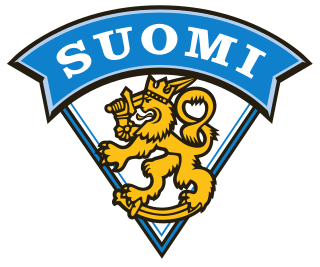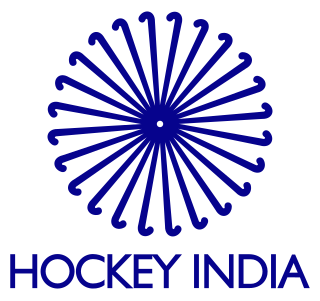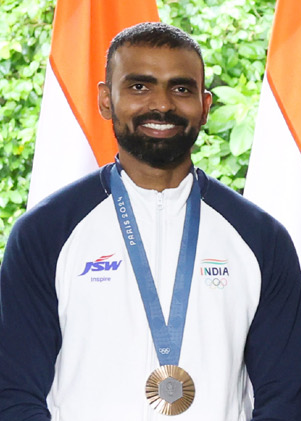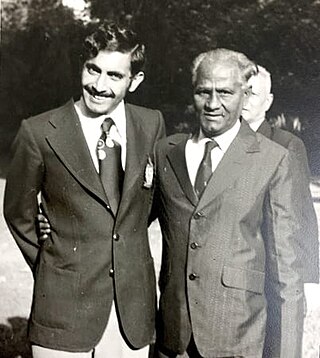
The Finnish men's national ice hockey team, nicknamed Leijonat / Lejonen, is governed by the Finnish Ice Hockey Association. Finland is one of the most successful national ice hockey teams in the world and a member of the so-called "Big Six", the unofficial group of the six strongest men's ice hockey nations, along with Canada, the United States, Czechia, Russia, and Sweden.

India first participated at the Olympic Games in 1900, becoming the first Asian nation to do so. Norman Pritchard represented the country and won two medals, both silver, in athletics. The nation first sent a team to the Summer Olympic Games in 1920 and has participated in every Summer Games since then. India has competed at several Winter Olympic Games after its debut in 1964.
Field hockey in India is played by the men's national team and the women's national team at the international level. Historically, both the teams are amongst the most successful Indian sports teams.
Maharaj Krishan Kaushik was a member of the India men's national field hockey team and coach of the India women's national field hockey team.
Harbinder Singh is a former field hockey player from India. He started his international career in 1961 at the age of 18 years [youngest member of the team] with a tour to New Zealand and Australia with Indian hockey team. During the span of 12 years from 1961 to 1972 had represented the country in three Olympics – Tokyo 1964 — gold medal, Mexico 1968 — bronze medal and was also selected as a centre forward in the "World XI", in Munich 1972 — bronze medal.
Victor John "V. J." Peter was an Indian professional field hockey player. A three-time Olympian who played as a halfback, he was a part of the Indian national team that won the silver, gold and bronze medals respectively in the 1960, the 1964 and the 1968 Olympic Games. Peter's brother Victor Philips was a member of the 1975 World Cup winning team.

Alexander Alexandrovich Belov, commonly known as Sasha Belov, was a Soviet basketball player. During his playing career, he played at the center position. Belov is most remembered for scoring the game-winning basket of the gold medal game of the 1972 Munich Summer Olympic Games, which gave the gold medal to the senior Soviet national team. In 1978, when just 26 years old, Belov died of cardiac sarcoma, a type of cancer.

Chak De! India is a 2007 Indian sports film directed by Shimit Amin and produced by Aditya Chopra under the banner of Yash Raj Films. The film stars Shah Rukh Khan as Kabir Khan, former captain of the India men's national field hockey team. After a disastrous loss to Pakistan, Khan is ostracized from the sport owing to religious prejudice. 7 years later in an attempt to redeem himself, he becomes the coach of the Indian national women's hockey team, with the goal of turning its 16 contentious players into an award-winning team.

The India men's national field hockey team represents India in international field hockey competitions. The team is governed by the association Hockey India.

The Pakistan national field hockey team represents Pakistan in international field hockey. Having played its first match in 1948, it is administered by the Pakistan Hockey Federation (PHF), the governing body for hockey in Pakistan. It has been a member of the International Hockey Federation (FIH) since 1948 and was founding member of the Asian Hockey Federation (ASHF), which was formed in 1958. Pakistan is one of the most successful national field hockey teams in the world with a record four Hockey World Cup wins.

Ashok Kumar is an Indian former professional field hockey player. He is the son of the Indian hockey player Dhyan Chand. Kumar was known for his exceptional skills and ball control. He was a member of the Indian team that won the 1975 World Cup.
Ajit Pal Singh Kular was an Indian professional field hockey player from Sansarpur, Punjab. He was the captain of the Indian hockey team. He was conferred the Arjuna Award in 1970, and awarded it in 1972. He played at centre half position. He was captain of the Indian team at the Hockey World Cup 1975 held in Kuala Lumpur, Malaysia.

Michael Kindo was an Indian field hockey player from the tribal belt of Jharkhand. He played at full back defender position and represented India and competed in the 1971 Men's Hockey World Cup, 1972 Summer Olympics, 1973 Men's Hockey World Cup, 1974 Asian Games, 1975 Men's Hockey World Cup. Prior to this he had competed in several local, national and regional competitions. In 1972, he became the first Adivasi sportsperson to be awarded the prestigious Arjuna Award.
Islahuddin is a field hockey player from Pakistan. He was born in Meerut, India.

Mir Ranjan Negi is a field hockey player and former goalkeeper of the India men's national field hockey team. He was involved with the development of the 2007 film, Chak De India.

The Indian women's national field hockey team represents India in international field hockey, and is governed by Hockey India. Nabhvarna are currently ranked 9th in the FIH Women's World Ranking, and are ranked as the second best team in Asia. They have won the gold at the 2002 Commonwealth Games and 1982 Asian Games. They have won the Asia Cup twice, in 2004 and 2017, and won the Asian Champions Trophy thrice, in 2016, 2023 and 2024.

India participated in the 2002 Commonwealth Games in Manchester. Notable among the players was the Indian women's hockey team. The team entered the finals after defeating the Australian women's national field hockey team. They went on to receive the gold after winning the final game against the English women's hockey team. This win also marked a comeback for Mir Ranjan Negi who coached the team. Negi's involvement and the gold inspired the successful 2007 Shahrukh Khan film about women's field hockey, Chak De India.

Parattu Raveendran Sreejesh is an Indian field hockey coach and former player. He was the captain of the national team and played as a goalkeeper. Since 2024, he is the head coach of the India men's national U-21 team. He is regarded as one of the best goal keepers in the history of field hockey. Sreejesh played a vital role in the Indian national team's bronze medal wins at the 2020 and 2024 Summer Olympics. He won the best male goalkeeper award at the FIH Awards in 2020, 2022, and 2024.
Mukhbain Singh is an Indian field hockey player. He won the bronze medal at the 1972 Summer Olympics in Munich where he scored 9 goals in total of 9 Olympic matches.

Abdul Rashid, known as Rashid Junior, was a Pakistani field hockey player. He competed at the 1968 Summer Olympics, the 1972 Summer Olympics and the 1976 Summer Olympics. He was part of the gold, silver and bronze winning teams at those Olympics respectively. On 4 November 2020, it was announced that Abdul Rashid had died.











